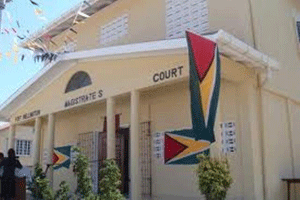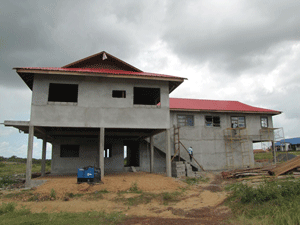“THE current administration has long realised that the modernisation of its laws and an effectively functioning justice system bear a causal relationship to economic development and, ultimately, the advancement of its people.  And it is against this background that the administration has made continuous strides over the years to ensure Guyanese have a fair and ready access to justice.
And it is against this background that the administration has made continuous strides over the years to ensure Guyanese have a fair and ready access to justice.
“In this regard, the Government spent more than $1.7B during 2011 for the continued development of the sector; and this year, we will spend approximately $2.1 Billion in the sector.”
Those were the words of Minister of Legal Affairs and Attorney General (AG), Anil Nandlall, during an exclusive interview with the Government Information Agency (GINA).
“Substantial progress has been made towards completing the revision of the Laws of Guyana up to 2010. The last time this exercise was conducted was in 1977. Both hard and soft copies of the Laws shall be made available for distribution shortly,” the AG stated.
“The compilation of the law reports for the period 1932 to 2007, along with a consolidated index, will also be made available.
“In the last Parliament, several pieces of legislation were enacted, such as the Time Limit for Judicial Decisions Act, which imposes a time limit on judges for writing up their decisions; the Amendment to the Evidence Act, which allows for the admissibility of audio visual testimony; the  Contempt of Court Act, the Alternative Dispute Resolution Act, the Judicial Review Act, the Paper Committal Legislation, the Plea Bargaining Act, the Lay Magistrates Act, the Legal Practitioners’ Act and the Act to increase the jurisdiction of the Magistrate’s Court to deal with more civil matters.
Contempt of Court Act, the Alternative Dispute Resolution Act, the Judicial Review Act, the Paper Committal Legislation, the Plea Bargaining Act, the Lay Magistrates Act, the Legal Practitioners’ Act and the Act to increase the jurisdiction of the Magistrate’s Court to deal with more civil matters.
“The Alternative Dispute Resolution Act provides for the settlement of disputes out of court.
“The common thread in all these legislation is that they are designed to bring speed to the resolution of legal disputes,” the AG emphasised.
The administration has also embarked on these transformational changes under the Modernisation of the Justice Administration Sector Project, an Inter-American Development Bank (IDB)-funded project.
This project embraces several concepts that are intended to modernise the system and make it more accountable, transparent and efficient.
“The programme is now going through its final stages,” Nandlall stated. The final stages will see the establishment of a Director of Public Prosecutions (DPP) office in New Amsterdam, Berbice, for the first time in the history of the country. The establishment of such an important office in the Ancient County will see the delivery of an important service to the region.
The final stages will see the establishment of a Director of Public Prosecutions (DPP) office in New Amsterdam, Berbice, for the first time in the history of the country. The establishment of such an important office in the Ancient County will see the delivery of an important service to the region.
Meanwhile, the current DPP office in Georgetown is undergoing renovations to the physical structure, and in respect of its institutional building, to foster inter-connectivity with various important and relevant agencies, the minister continued.
A new magisterial district is being established in Linden, to aid efficiency and to improve accessibility to justice.
Currently, Linden is part of the Magisterial District of West Demerara, with the office of the magistrate’s court in Wismar being located in Vreed-en-Hoop, Region Three.
“The creation of such a district and a magistrate’s office in that district means that those desirous of filing matters no longer have to travel to Vreed-en-Hoop to do so,” he stated. Moreso, women would no longer have to travel to Region Three to uplift their child support or maintenance payments, the Minister stated.
Moreso, women would no longer have to travel to Region Three to uplift their child support or maintenance payments, the Minister stated.
In excess of $300M will be spent during the year to construct, rehabilitate and maintain court facilities countrywide, especially in Bartica, New Amsterdam, Lethem, Wales and Mibicuri; whilst $25M would be spent to construct a new Mediation Centre in New Amsterdam.
These are all examples of Government improving access to services within the justice sector.
Magistrate’s courts that are being constructed in Bartica, Berbice, Lethem and other outlying areas will now have facilities to house and accommodate a magistrate, thereby allowing for more frequent sittings of the court in these areas, to address the increase in workload and backlog cases, according to the AG.
Family Court
The Family Court will soon be operational, as its rules have been laid in the National Assembly and plans are underway to furnish it.
“Government’s objective in conceiving the concept of establishing a Family Court lies in the philosophy that the family is central to the development of a country; because, as a social unit, it is integral to the advancement of a people and of the society,” the AG pointed out.
Whilst Government has already invested significant sums on youths, and has enacted laws revamping the entire landscape of the legislation in relation to children and women, the establishment of the Family Court will deal with family-related matters, most of which impact on every aspect of life of a family, specifically children.
Deeds Registry
“A Commercial Registry is to be established, which will migrate away from the Deeds Registry commercial matters that are being dealt with at the Deeds Registry which should not, in principle, be there; such as the incorporation of companies’ bills of sale, the filing of bills of sale, filing of debentures, filing of business registration, amongst other types of transactions which are now being done at the Deeds Registry,” Minister Nandlall explained.
He added that “this new registry will exclusively deal with such activities, and will be physically housed away from the Deeds Registry, as Central Government has approved the lower flat of the building owned by CLICO at Parade and Lamaha streets for this purpose.”
The Minister also announced that the Deeds, Land and the Commercial registries will be converted into semi-autonomous agencies, delinking them from Central Government so that greater efficiency can be obtained.
In this new regime, a new fee structure will also be implemented at the Deeds Registry, as the current one being charged for services is out of sync with reality.
The example of $20 for the filing of a power of attorney is testimony to the fact that the unrealistic fee structure has been overtaken by reality, the Minister argued.
These reforms all form part of Government’s initiative and policy to improve efficiency, not only in the justice sector, but also in the public sector and in the quality of services which Government is rendering to its citizens.




.png)









